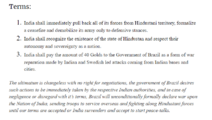Hindustani-Indian War: Difference between revisions
>Lucas Artoni No edit summary |
>Lucas Artoni No edit summary |
||
| Line 8: | Line 8: | ||
Most Brazilian politicians and generals days prior to the dispatch of the Ultimatum seriously doubted that peace could be achieved without bloodshed. mass mobilization began before the war started and the Brazilian army changed its numbers from 5 soldiers to over 10 in one single day. | Most Brazilian politicians and generals days prior to the dispatch of the Ultimatum seriously doubted that peace could be achieved without bloodshed. mass mobilization began before the war started and the Brazilian army changed its numbers from 5 soldiers to over 10 in one single day. | ||
A Brazilian delegation was sent to Sweden to propose a cease-fire, the delegation was attented by the Swedish Marshall Sweharry and after negotiations peace was arranged, Sweden would remain neutral in the war and would cease it's attacks on Nashik. | A Brazilian delegation was sent to Sweden to propose a cease-fire, the delegation was attented by the Swedish Marshall Sweharry and after negotiations peace was arranged, Sweden would remain neutral in the war and would cease it's attacks on<gallery orientation="square"> | ||
20181220174011_1.jpg|Brazilian Generals speaking to Marshall Sweharry | |||
20181220172635_1.jpg|Brazilian Delegation going to the capital of Sweden, Stockholm. | |||
20181220180417_1.jpg|The Cease-Fire is put into action. | |||
</gallery> Nashik. | |||
Revision as of 20:36, 21 December 2018
Description:
The Hindustani-Indian war was made upon series of attacks coming from Indian, Nazi and Swedish forces upon the city of Nashik, part of the Nation of Hindustan and home to a population made up of only brazilians. After many clashes and skirmishes in the region, the Brazilian government voted to interfere on the conflict on Hindustan's side, in name of it's strong ties with the city of Nashik. Winning by unanimity on the Brazilian Federal Senate, the decision taken was to present an ultimatum to Indian authorities demanding immediate cease-fire and the payment of 40 golds as war reparations made by the prior clashes and attacks to Nashik.
Most Brazilian politicians and generals days prior to the dispatch of the Ultimatum seriously doubted that peace could be achieved without bloodshed. mass mobilization began before the war started and the Brazilian army changed its numbers from 5 soldiers to over 10 in one single day.
A Brazilian delegation was sent to Sweden to propose a cease-fire, the delegation was attented by the Swedish Marshall Sweharry and after negotiations peace was arranged, Sweden would remain neutral in the war and would cease it's attacks on
Nashik.
Battles
Using subdivisions or a list, battles should be listed, with all or at least major ones detailed.



